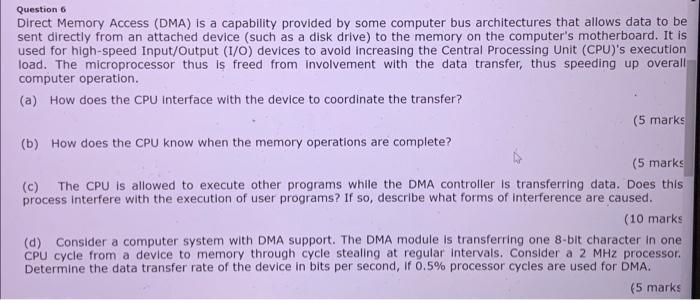Question: subject: Computer Architecture Question 6 Direct Memory Access (DMA) is a capability provided by some computer bus architectures that allows data to be sent directly

Question 6 Direct Memory Access (DMA) is a capability provided by some computer bus architectures that allows data to be sent directly from an attached device (such as a disk drive) to the memory on the computer's motherboard. It is used for high-speed Input/Output (1/O) devices to avoid increasing the Central Processing Unit (CPU)'s execution load. The microprocessor thus is freed from involvement with the data transfer, thus speeding up overall computer operation. (a) How does the CPU interface with the device to coordinate the transfer? (b) How does the CPU know when the memory operations are complete? (c) The CPU is allowed to execute other programs while the DMA controller is transferring data. Does this process interfere with the execution of user programs? If so, describe what forms of interference are caused. (10 marks (d) Consider a computer system with DMA support. The DMA module is transferring one 8-bit character in one CPU cycle from a device to memory through cycle stealing at regular intervals. Consider a 2 MHz processor. Determine the data transfer rate of the device in bits per second, if 0.5% processor cycles are used for DMA
Step by Step Solution
There are 3 Steps involved in it

Get step-by-step solutions from verified subject matter experts


